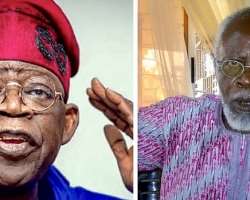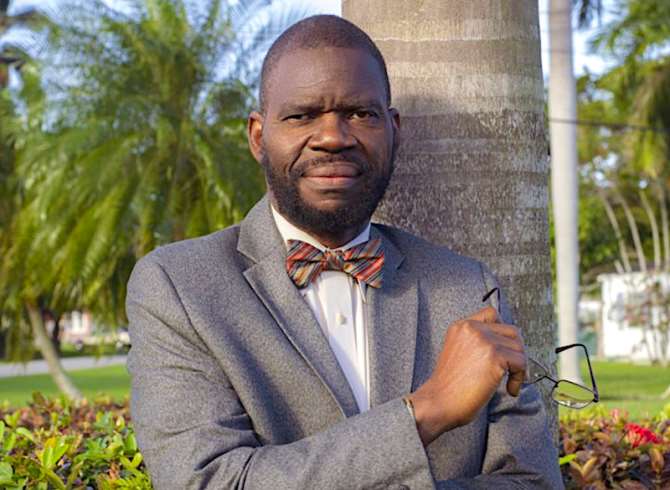President Bola Tinubu Must Act Now: University of Uyo Must Reinstate Prof. Inih Ebong as Full Professor—Let Him Retire with Dignity

A Lifetime of Injustice Must End
For over two decades, Prof. Inih Ebong has been locked in a relentless battle against institutional oppression. A scholar of integrity and a fearless critic of corruption, he was wrongfully dismissed by the University of Uyo in 2002 for daring to challenge maladministration within the institution. In a just society, he would have been celebrated for his courage. Instead, he was thrown into professional exile, his career cut short by an establishment that sought to silence him.
Despite his unwavering pursuit of justice, and despite multiple court rulings ordering his reinstatement, the university has refused to comply. Successive vice-chancellors have deliberately ignored judicial mandates, treating the courts with contempt while ensuring that Prof. Ebong remains in limbo—denied his rightful place in academia, stripped of his income, and left to suffer under the weight of hardship.
At 73 years old, he is no longer just battling injustice; he is also battling for his life. Diagnosed with cardiac failure in 2020, he has endured years of illness without the financial security he should have had. He has been unable to properly care for himself or his family, forced to rely on the generosity of others—including billionaire Femi Otedola, who stepped in to fund his medical treatment. It is an unspeakable tragedy that a man who dedicated his life to educating young minds and upholding academic excellence has been reduced to this state—all because he refused to compromise on principles.
Now, with his health deteriorating, time is running out. His words—“Today, I am virtually bedridden at home while I await the inevitable to happen! May it not be said that the University was awaiting to resolve this matter posthumously”—should shake the conscience of every Nigerian. The question now is whether President Bola Tinubu will act before it is too late, or whether the nation will once again fail a man who has already suffered more than enough.
Sick or Not, Justice Cannot Be Denied
Yes, Prof. Ebong is sick. Yes, he may never return to a classroom. But that is not the point. Justice is not conditional ona person’s ability to serve—it is a fundamental right. Prof. Ebong must be reinstated immediately, promoted to the rank of full professor, and given every entitlement he was denied for over twenty years. Whether he chooses to work for one minute or one year is irrelevant. That decision must be his to make—not the university’s, not the government’s, and certainly not the corrupt administrators who sought to destroy him.
This is not just a case of reinstating an academic; it is about restoring the dignity of a man who was robbed of everything he worked for. It is about sending a message that integrity still matters in Nigeria, that justice is not reserved only for the powerful, and that no institution—no matter how influential—can act with impunity.
Prof. Ebong’s struggle is a tragic reflection of how Nigeria treats its finest minds. Instead of rewarding brilliance and integrity, the system punishes those who refuse to conform to corruption. His case serves as a warning to every honest academic, journalist, activist, and professional: stand up for what is right, and you may find yourself abandoned, ridiculed, and left to die in misery. If this injustice is allowed to persist, it will set a dangerous precedent, reinforcing the idea that corruption always wins.
President Tinubu Must Act—No More Delays
President Bola Tinubu has no need for further investigations, committees, or bureaucratic delays. The facts are clear. The courts have spoken. The university has exhausted every possible excuse. The only thing left is to enforce justice.
Prof. Ebong must be reinstated immediately as a full professor. His entitlements must be paid in full, including all unpaid salaries, gratuity, pension, and the N10 million damages awarded to him by the courts. Every attempt to erase his legacy must be undone—including the defamatory disclaimer the university published in the Punch newspaper in 2002, which sought to ruin his reputation and prevent him from securing employment elsewhere.
If he chooses to retire the very next minute after his reinstatement, that must be his decision to make. What matters is that his record is cleared, his achievements are recognized, and he is given the honor and dignity he was robbed of for two decades.
The University of Uyo must not be allowed to operate as a rogue institution that disregards court orders. Its leadership must be held accountable for this gross misconduct. The vice-chancellors who willfully ignored judicial rulings must be investigated for their actions, and a precedent must be set that no Nigerian institution—academic or otherwise—is above the law.
This is not a case of mercy—it is a case of law, ethics, and fundamental human rights. Prof. Ebong’s battle should never have lasted this long. The fact that he has had to fight this hard for something as basic as justice is an indictment of Nigeria’s broken system.
A Test of Nigeria’s Leadership and National Integrity
This is more than just one man’s case. It is a test of Nigeria’s institutions, its leadership, and its commitment to justice. If a distinguished scholar can be treated this way despite overwhelming legal victories, what hope is there for the average Nigerian? If a university can openly defy court orders without consequences, what does that say about the strength of our judiciary? If a man can suffer for twenty years simply because he refused to tolerate corruption, how can we claim to be a nation governed by law?
University of Uyo Must Be Held Accountable
If a university can openly defy court orders without consequences, what does that say about the strength of our judiciary? It signals a breakdown of the rule of law, where justice is treated as an option rather than an obligation. It emboldens lawlessness, proving that power, not justice, dictates outcomes in Nigeria. When an academic institution becomes a symbol of defiance against the courts, it erodes public trust and weakens the judiciary’s credibility.
The University of Uyo and those responsible for this blatant defiance must be dealt with. This is no longer just about reinstating Prof. Inih Ebong—it is about reasserting judicial authority and ensuring no institution is above the law. If those who obstruct justice face no consequences, this injustice will continue. The government must act now, or risk setting a dangerous precedent where corruption and impunity rule unchecked.
President Tinubu’s response to this case will define his administration’s stance on justice. Will he prove that his government is serious about upholding the rule of law, or will he allow yet another case of institutional wickedness to go unpunished? His decision will send a powerful message—not just to academia, but to every Nigerian who has ever fought against oppression.
Prof. Ebong has suffered long enough. He has fought long enough. He should not have to beg any longer for what is rightfully his. The time for action is now. Anything less than immediate justice would not just be an institutional failure—it would be a national disgrace.
Nigeria cannot afford another historic injustice. This must not become yet another case where the guilty go unpunished, where the righteous are left to wither away in despair, and where justice is only served after the victim is gone. If President Tinubu truly stands for fairness, this is his moment to prove it.
Prof. Inih Ebong must be reinstated and recognized as a full professor—whether he serves for one minute or not. Anything less is unacceptable.
Prof. John Egbeazien Oshodi
Oshodi Open Door, also known as Oshodi Open Door Public Training (OOPDT, pronounced opidt), is a public awareness initiative promoting transparency, accountability, and integrity in Africa through educational articles and resources at [email protected], and offers specialized Timely Response Solutions (TRS) training at minimal or no cost.
John Egbeazien Oshodi is an American psychologist, educator, and author. Born in Uromi, Edo State, Nigeria, he is the son of a 37-year veteran of the Nigeria Police Force. Professor Oshodi is an expert in cross-cultural psychology, forensic/clinical psychology, police and prison science, and social justice.
He has made significant contributions to forensic psychology, introducing it to Nigeria in 2011 through the National Universities Commission (NUC) and Nasarawa State University. Professor Oshodi has taught at several institutions, including Florida Memorial University, Florida International University, and Nova Southeastern University.
Currently, he serves as a government consultant for forensic-clinical psychological services in the USA and practices as a clinical and forensic psychologist. He also holds virtual faculty roles at Walden University and other institutions. Professor Oshodi has authored numerous publications and founded the Psychoafricalysis theory in psychology.

